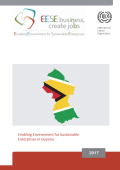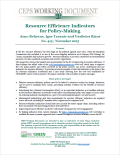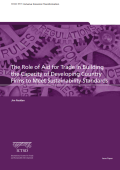


In the EU, resource efficiency has been high on the political agenda since 2011, when the European Commission first included it as one of the seven flagship initiatives in its Europe 2020 Strategy for “smart, sustainable and inclusive growth”. Resource efficiency is not only considered an environmental necessity, but also a political, economic and security opportunity.
This paper first stresses the benefits and opportunities for the EU of improving its resource efficiency. It then explains the added value of the www.measuring-progress.eu web tool, which aims to improve the way policy-makers and others involved in the policy process can access, understand and use indicators for resource efficiency. It provides practical examples of relevant indicators in the form of the EU Resource Efficiency Scoreboard and a case study showing how the web tool established by NETGREEN can be used in practice. The paper concludes with a number of policy messages.

One of the major contemporary challenges facing developing country firms, and especially small and medium-sized enterprises (SMEs), is the ever increasing number of regulations and sustainability standards required of them if they are to integrate into global value chains. The paper "The Role of Aid for Trade in Building the Capacity of Developing Country Firms to Meet Sustainability Standards" focuses on the potential role that Aid for Trade—aid designed specifically to assist developing countries in overcoming supply-side issues and capture the gains of trade—can play in assisting those developing country SMEs and small producers who are struggling to comply with the sustainability standards required by value chains.
